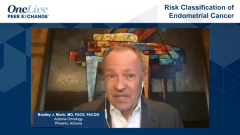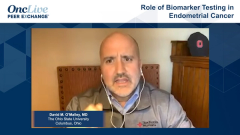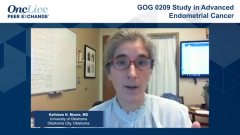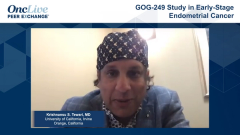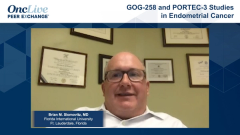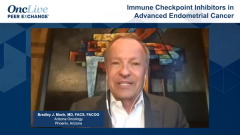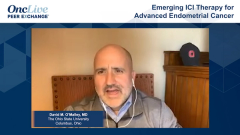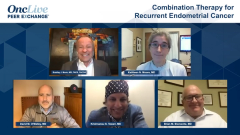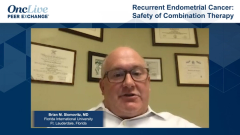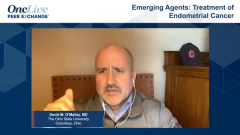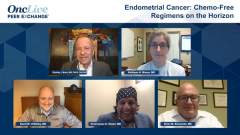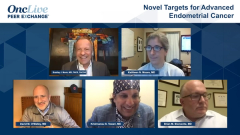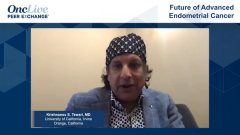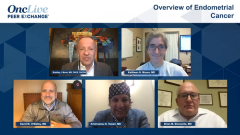
Role of Biomarker Testing in Endometrial Cancer
Episodes in this series

Bradley J. Monk, MD, FACS, FACOG: Surgery is important. Anatomic, typical FIGO [International Federation of Gynecology and Obstetrics] staging is important. The molecular biology of the tumor is important. Dave, bring us back to practicality. I do a robotic hysterectomy as I did yesterday. What does the pathologist do with that tissue? What are the typical biomarkers that are the global standard in endometrial cancer?
David M. O’Malley, MD: First of all, we need to assess the nodes. Most of us are doing sentinel lymph nodes at this point, and we think that adds to this dividing into stage III, which obviously is a higher risk. We have that. Let’s get the information we need surgically with the hysterectomy and at least sentinel lymph nodes, at the very least, mismatching pair proteins through IHC [immunohistochemistry] at the time of diagnosis. At this point, I would advocate—based on prognostic factors and potential treatment options, as well as identification of people with Lynch syndrome potentially or families with Lynch syndrome—that we do that as a baseline.
What is an evolution? Even though the NCCN [National Comprehensive Cancer Network] Guidelines changed last year, looking at this molecular classification based on the PORTEC trial that is still having a difficult time getting payers to reimburse and thus having my pathologist do these extra tests. What are some of the other things? Well, MSI [microsatellite instability]. Should we be doing that PCR [polymerase chain reaction] test if the MMR [mismatch repair] proteins are all intact? We’re not doing that yet, but that’s something I do on recurrence. How about the IHC for TP53 that Katie and Brian have mentioned? That should probably be done routinely, but we need to make sure the payers are paying that. As we look at the POLE and the next generation sequencing, as well as additional mutational analysis, there are some other subgroups that maybe will identify their predictive in the future.
But at diagnosis, particularly in early stage disease, that’s not routinely being done, and we’re having trouble getting reimbursed. We really need to look and work with our pathologists as well as the payers to make sure these things are reimbursed so that we are able to perform those tests. I personally don’t think PD-L1 testing should be done. I see that frequently, especially in patients who are coming in for a referral, because we really haven’t seen that it is a marker in endometrial cancer. Don’t do a test if you don’t know what to do with the results.
Bradley J. Monk, MD, FACS, FACOG: How about HER2 [human epidermal growth factor receptor 2] and ER [estrogen receptor], PR [progesterone receptor]?
David M. O’Malley, MD: Great question. As we look at these, as HER2 moves from the serous cancer where we have data, where it makes the clinical significance, clearly it should be done in all advanced-stage serous cancers. We’re not doing it at our institutions for the local or stage I or II disease, but it’s a consideration as we move forward. We’re not doing ER-PR routinely, but it’s really interesting information. I would argue that anybody with a grade 1 is going to be ER-PR positive. For that grade 2 and 3, you may bring a new set of treatments in that you otherwise wouldn’t use.
Bradley J. Monk, MD, FACS, FACOG: I called you my brother when I introduced you. That’s way too complicated. If you tell your pathology what you just said, it isn’t going to work. Krish, I need you to boil it down here. Then I’ll get Brian. Boil it down—just a bite size. Go ahead. What biomarkers do you want done?
Krishnansu S. Tewari, MD: I want TILs [tumor-infiltrating lymphocytes]. That’s what I want to know. Because that’s going to make a difference in whether immunotherapy is going to be effective for advanced disease.
Bradley J. Monk, MD, FACS, FACOG: All right. Brian, help us. Come on, man.
Brian M. Slomovitz, MD: I appreciate that earlier you said we come from esteemed universities and that we’re all really smart, but I like to keep it simple. The advantage of molecular profile in these tumors is that 1 of the things we haven’t mentioned is that it makes it more reproducible for pathologists to come up with the same diagnosis.
Bradley J. Monk, MD, FACS, FACOG: Yes.
Brian M. Slomovitz, MD: Prior to molecular profiling, it’s subjective. Here you get endometrial cancer, and No. 1, you do a TP53 stain.
Krishnansu S. Tewari, MD: Why?
Brian M. Slomovitz, MD: If it’s TP53 positive, you follow it up with a HER2/neu, regardless if it’s serous or endometrioid, because the pathologist could be wrong. If it’s TP53 negative, you do ER-PR. It’s simple and straightforward. Anyone can do it.
Bradley J. Monk, MD, FACS, FACOG: In mismatch repair deficiencies?
Kathleen N. Moore, MD: Mismatch repair.
Brian M. Slomovitz, MD: Mismatch repair, yes.
Krishnansu S. Tewari, MD: You take care of the patients.
Bradley J. Monk, MD, FACS, FACOG: I love it.
Brian M. Slomovitz, MD: Add that on. But TP53 is more important than histology.
Bradley J. Monk, MD, FACS, FACOG:TP53 is the fulcrum. If you’re TP53 positive—in other words, mutated—then you do HER2. If you’re not, you do ER-PR. You do immunohistochemistry on those—basically all patients. It’s basically the nonserous, but they might be wrong.
Brian M. Slomovitz, MD: We just made a very complicated subject matter very simple.
Bradley J. Monk, MD, FACS, FACOG: All right. That’s rare for you guys. Wow. Hopefully we can keep the momentum going.
David M. O’Malley, MD: I love it.
Bradley J. Monk, MD, FACS, FACOG: I don’t mean to insult my good friend, Dave O’Malley. But there’s a real ability here to be astute and smart, and you’re that, Dave. Thank you. I’m so glad to have you here.
Transcript Edited for Clarity


